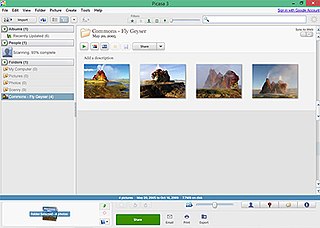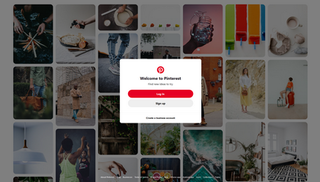Google Shopping, formerly Google Product Search, Google Products and Froogle, is a Google service created by Craig Nevill-Manning which allows users to search for products on online shopping websites and compare prices between different vendors. Google announced at its Marketing Live event in May 2019 that the new Google Shopping will integrate the existing Google Express marketplace into a revamped shopping experience. In the US, Google Shopping is accessible from the web and mobile apps, available on Android and iOS. Google Shopping is also available in France, accessible from the web only. Like its predecessor, Google Shopping is free and requires a personal Google account in order to purchase from the platform. A colored price tag icon replaces the parachute icon from Google Express.

A9.com was a former subsidiary of Amazon that developed search engine and search advertising technology. A9 was based in Palo Alto, California, with teams in Seattle, Bangalore, Beijing, Dublin, Iași, Munich and Tokyo. A9 has development efforts in areas of product search, cloud search, visual search, augmented reality, advertising technology and community question answering.
Google AdSense is a program run by Google through which website publishers in the Google Network of content sites serve text, images, video, or interactive media advertisements that are targeted to the site content and audience. These advertisements are administered, sorted, and maintained by Google. They can generate revenue on either a per-click or per-impression basis. Google beta-tested a cost-per-action service, but discontinued it in October 2008 in favor of a DoubleClick offering. In Q1 2014, Google earned US$3.4 billion, or 22% of total revenue, through Google AdSense. AdSense is a participant in the AdChoices program, so AdSense ads typically include the triangle-shaped AdChoices icon. This program also operates on HTTP cookies. In 2021, over 38.3 million websites use AdSense.

Picasa was a cross-platform image organizer and image viewer for organizing and editing digital photos, integrated with a now defunct photo-sharing website, originally created by a company named Lifescape in 2002. "Picasa" is a blend of the name of Spanish painter Pablo Picasso, the word casa and "pic" for pictures.

Online shopping is a form of electronic commerce which allows consumers to directly buy goods or services from a seller over the Internet using a web browser or a mobile app. Consumers find a product of interest by visiting the website of the retailer directly or by searching among alternative vendors using a shopping search engine, which displays the same product's availability and pricing at different e-retailers. As of 2020, customers can shop online using a range of different computers and devices, including desktop computers, laptops, tablet computers and smartphones.
Local search is the use of specialized Internet search engines that allow users to submit geographically constrained searches against a structured database of local business listings. Typical local search queries include not only information about "what" the site visitor is searching for but also "where" information, such as a street address, city name, postal code, or geographic coordinates like latitude and longitude. Examples of local searches include "Hong Kong hotels", "Manhattan restaurants", and "Dublin car rental". Local searches exhibit explicit or implicit local intent. A search that includes a location modifier, such as "Bellevue, WA" or "14th arrondissement", is an explicit local search. A search that references a product or service that is typically consumed locally, such as "restaurant" or "nail salon", is an implicit local search.
A product feed or product data feed is a file made up of a list of products and attributes of those products organized so that each product can be displayed, advertised or compared in a unique way. A product feed typically contains a product image, title, product identifier, marketing copy, and product attributes. But, can also contain links to rich media assets such as videos, 3D animations, brochures, product stories, product relations, and reviews, as in the case of Open Icecat, the multilingual open content catalogue.
Social shopping is a method of e-commerce where shoppers' friends become involved in the shopping experience. Social shopping attempts to use technology to mimic the social interactions found in physical malls and stores. With the rise of mobile devices, social shopping is now extending beyond the online world and into the offline world of shopping.
A comparison shopping website, sometimes called a price comparison website, price analysis tool, comparison shopping agent, shopbot, aggregator or comparison shopping engine, is a vertical search engine that shoppers use to filter and compare products based on price, features, reviews and other criteria. Most comparison shopping sites aggregate product listings from many different retailers but do not directly sell products themselves, instead earning money from affiliate marketing agreements. In the United Kingdom, these services made between £780m and £950m in revenue in 2005. Hence, E-commerce accounted for an 18.2 percent share of total business turnover in the United Kingdom in 2012. Online sales already account for 13% of the total UK economy, and its expected to increase to 15% by 2017. There is a huge contribution of comparison shopping websites in the expansion of the current E-commerce industry.
Bing Shopping is a products search and discovery service that helps save time by bringing products from multiple sellers together on a single website. It uses Bing to show product results–including photos and product details. Products can be filtered and prices compared. Purchases are completed on the seller's website.
An online shopping directory is a "Yellow Pages-Style" web directory that specializes in ecommerce sites. Inspired by the organizational structure used in traditional shopping mall directories, online shopping directories organize ecommerce sites by their category and subcategory of goods sold. Without the constraints related to shopping at a physical mall, an online shopping directory serves to aggregate all ecommerce sites in one centralized location in order to help a user decide where to shop online.
TinEye is a reverse image search engine developed and offered by Idée, Inc., a company based in Toronto, Ontario, Canada. It is the first image search engine on the web to use image identification technology rather than keywords, metadata or watermarks. TinEye allows users to search not using keywords but with images. Upon submitting an image, TinEye creates a "unique and compact digital signature or fingerprint" of the image and matches it with other indexed images. This procedure is able to match even heavily edited versions of the submitted image, but will not usually return similar images in the results.

Twinity is a 3D online virtual world. Initially developed by Metaversum GmbH, it is currently held by ExitReality. The game offers its population, called Twinizens, to navigate around virtual (historical) versions of real-world cities, also called a mirror world or a Metaverse. A public beta began in September 2008, with the release of the first virtual city, Berlin, which later was followed by Singapore, London, Miami and New York. Twinity is built on BigWorld Technology and its economy is based on a free-to-play model.

Reverse image search is a content-based image retrieval (CBIR) query technique that involves providing the CBIR system with a sample image that it will then base its search upon; in terms of information retrieval, the sample image is very useful. In particular, reverse image search is characterized by a lack of search terms. This effectively removes the need for a user to guess at keywords or terms that may or may not return a correct result. Reverse image search also allows users to discover content that is related to a specific sample image or the popularity of an image, and to discover manipulated versions and derivative works.
Seadragon Software was a team within the Microsoft Live Labs. Its product, Seadragon, is a web optimized visualization technology that allows graphics and photos to be smoothly browsed, regardless of their size. Seadragon is the technology powering Microsoft's Silverlight, Pivot, Photosynth and the standalone cross-platform Seadragon application for iPhone and iPad.

Pinterest is an American image sharing and social media service designed to enable saving and discovery of information like recipes, home, style, motivation, and inspiration on the internet using images and, on a smaller scale, animated GIFs and videos, in the form of pinboards. The site was created by Ben Silbermann, Paul Sciarra, and Evan Sharp; it had 463 million global monthly active users as of April 2023. It is operated by Pinterest, Inc., based in San Francisco.

Google Catalogs was a shopping application for tablet computers, which was produced by Google in August 2011. Google Catalogs delivered virtual catalogs to users from merchants like Nordstrom, L.L. Bean, Macy's, Pottery Barn, and many more. Merchants were added through a process by which they submitted a form with information and a sample of their catalog, which was then reviewed by Google’s editorial team. The application was noted as a "Greener Way to Shop", as the digitization of catalogs substituted for paper versions. Google announced the intent to discontinue the iPad app effective August 2013 and eventually shut down the project entirely in August 2015.
Macroglossa was a visual search engine based on the comparison of images, coming from an Italian Group. The development of the project began in 2009. In April 2010 is released the first public alpha. Users can upload photos or images that they aren't sure what they are to determine what the images contain. Macroglossa compares images to return search results based on specific search categories. The engine does not use technologies and solutions such as OCR, tags, vocabulary trees. The comparison is directly based on the contents of the image which the user wants to know more.
Pricesearcher was an independent e-commerce search engine launched in the UK in 2016 which now focussing on top 10 lists and providing lists based on sales with no price comparison functionality. It does not use the traditional Price Comparison Website (PCW) model adopted by comparison sites such as Moneysupermarket.com and search engines such as Google Shopping where retailers pay to list their products for sale. Since its inception, it has listed products from online retailers, without charging a listing fee or commission for sales. Product search results are consequently unaffected by a retailer's marketing budget or lack thereof. Shoppers are able to use the vertical search engine as a price-checking tool, to see whether the goods they find 'on sale' elsewhere are genuinely a good deal.
Petal Search is a mobile Search-based application for Android, owned and operated by Huawei and aimed at allowing users to find apps and web results delivered by Microsoft Bing. It originally had an independent search engine under the same name available on the web, but it was quietly discontinued on June 25th, 2023. The Petal suite of search, mail, and maps were created in response to sanctions that barred Huawei from using Google Mobile Services. The engine provides comprehensive search functionality including text, voice, visual, news, video, app, shopping, travel, and local searches. It can present mobile app results from the Huawei AppGallery and other trusted app stores. Petal's design, which includes a dark mode, is based on a mobile-first approach. Launched globally, the service is especially focused on European markets and supports 55 languages in 170 countries and regions as of November 2021. The Petal Search app is available in the Huawei AppGallery and the Apple App Store.






